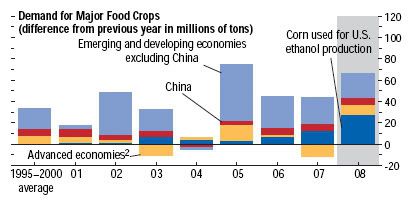- Mr. McCain advocates eliminating the multibillion-dollar annual government subsidies that domestic ethanol has long enjoyed. As a free trade advocate, he also opposes the 54-cent-a-gallon tariff that the United States slaps on imports of ethanol made from sugar cane, which packs more of an energy punch than corn-based ethanol and is cheaper to produce.
"We made a series of mistakes by not adopting a sustainable energy policy, one of which is the subsidies for corn ethanol, which I warned in Iowa were going to destroy the market" and contribute to inflation, Mr. McCain said this month in an interview with a Brazilian newspaper, O Estado de São Paulo. "Besides, it is wrong," he added, to tax Brazilian-made sugar cane ethanol, "which is much more efficient than corn ethanol."
Mr. Obama, in contrast, favors the subsidies, some of which end up in the hands of the same oil companies he says should be subjected to a windfall profits tax. In the name of helping the United States build "energy independence," he also supports the tariff, which some economists say may well be illegal under the World Trade Organization’s rules but which his advisers say is not. (Larry Rohter, "Obama Camp Closely Linked With Ethanol," New York Times, 23 June 2008) - Although biofuels still account for only 1½ percent of the global liquid fuels supply, they accounted for almost half the increase in the consumption of major food crops in 2006-07, mostly because of corn-based ethanol produced in the United States.
(International Monetary Fund, World Economic Outlook, April 2008, p. 60)
Workers of the world are between a rock and a hard place, between those who take food from the poor to fuel their cars and those who think that bombing Iran is a great idea for energy security, and to make matters worse, they have to depend on American voters to navigate between them.





No comments:
Post a Comment